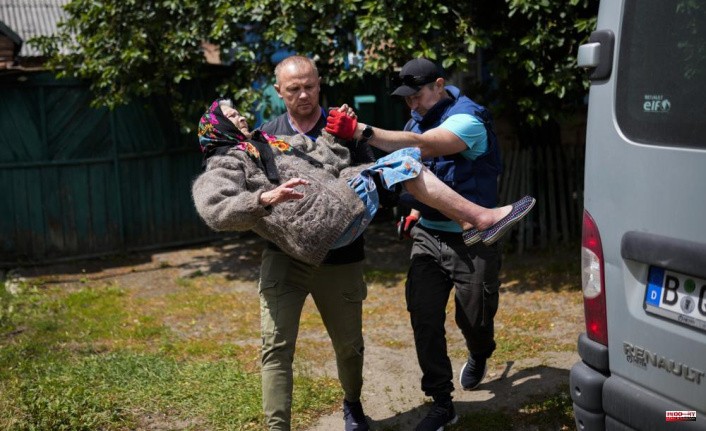As Russian forces advance, civilians flee eastern Ukraine to escape the threatening sound of sirens and gunfire.
As they negotiate narrow staircases in apartment buildings, volunteers transport the elderly and disabled in their arms to waiting minibuses. They then drive them to central staging points and to evacuation trains in other major cities.
"The Russians have right over there, they're close in on this location," Mark Poppert (an American volunteer working for the British charity RefugEase), said during Friday's evacuation in Bakhmut.
He said that Bakhmut was a high-risk zone right now. "We are trying to get as many people as possible out of Bakhmut in case the Ukrainians need to fall back."
Poppert stated that he and other Ukrainian and international volunteers who were assisting the Ukrainian charity Vostok SOS in coordinating the evacuation attempt were hoping to evacuate about 100 people from Bakhmut on Friday.
A few hours before, the sound of artillery was heard and black smoke rose from northern suburbs of the city, which is located in Ukraine's industrial eastern. Donetsk is part of the Donbas, which includes the Luhansk region and its neighboring regions. There, Moscow-backed separatists control some territory for the past eight years.
The evacuation process can be painful, physically exhausting and emotional.
Many of the evacuees have mobility issues, are elderly or ill, and volunteers must bundle them in soft stretchers to help them navigate narrow corridors and down stairs in apartment buildings.
Bakhmut is now inhabited by a majority of those who fled it. Only 30,000 people remain, compared to an 85,000 population before the war. Every day, more people leave.
North of Bakhmut, fighting has intensified as Russian forces try to seize key eastern cities Lysychansk and Sieverodonetsk, which are located 50 km (30 miles) to northeast. These two cities are the last to be under Ukrainian control within the Luhansk region.
Russia-backed rebels located northwest of Bakhmut, Donetsk, announced Friday that they had taken control of Lyman, a large railway station near Slovyansk (which is still under Ukrainian control), and Kramatorsk (which are still under Ukrainian supervision). From Slovyansk, you could clearly see smoke rising in the direction of Lyman on Thursday.
However, it's not easy to leave a situation like this: bombardment, missiles, and an advancing Russian army.
Svetlana Vova, a 66-year old manager of two apartments in Bakhmut, exaggerated when she heard that another resident was refusing to move.
She said, "I can't convince [them] to go." "I repeated to them that if anything lands here, I would be taking them (injured) to the same buses as those who have come to evacuate them."
She says she has tried everything she can to persuade holdouts, but almost two dozen refuse to compromise. They are more afraid to flee their homes and possessions in the face of uncertain futures than they are to stay and face the bombs.
She said that she will be staying in Bakhmut alone with her husband. They don't fear losing their property. They wait for their son, still in Sieverodonetsk to return home.
She said, "I'm going nowhere." "I must know that he is still alive. "That's why I am staying here."
Lvova shows her the last video that her son sent to her. He tells her that he is doing fine and that there is still electricity in the city, but not running water.
She cried, "I baked him big cake."
Poppert, an American volunteer, stated that it is not uncommon for people to request evacuation and then change their mind once the van arrives.
He said, "It's an extremely difficult decision for them to leave the only universe that they know."
He spoke of a man in his late 90s who was forced to leave the only place he knew.
Poppert stated, "We were taking that man out of his life." Poppert said, "He was afraid of the bombs or the missiles, and was afraid to leave."
Nearby Pokrovsk saw ambulances pull up to assist elderly women with wheelchairs and stretchers as they waited for the evacuation train that was heading west. As they boarded their train, families gathered around each other, carrying suitcases and pets.












